I wrote in a previous article, cataloguing five of the best alternative nights out in Dublin, that “We are all guilty of tarring Dublin’s nightlife scene with the same tired and underwhelming brush”. Retrospectively, I would revise this to exclude DJs. The demographic’s dynamism has endured repeated financial and political blows, and it kept creative momentum through a pandemic. Time and time again Dublin’s DJs have proved their fortitude, often exploring unorthodox and grassroots channels to outmanoeuvre a government seemingly hellbent on silencing their sound.
Systemic obstruction to nightlife is unfortunately nothing new. In fact, Dublin’s DJs and dancers have been fighting for their right to party since the 90s. When acid house, ecstasy and The Asylum (an inimitable Sackville Place institution) transformed the capital’s sonicscape, the change was met with Gardaí backlash. Unwittingly and unfairly a precedent for creative repression was set. However, if there is any silver lining to be taken from generations of DJs’ habituation to hostility, it’s that a legacy of resistance and defiance has developed. The unparalleled Creation collective of the late 90s and early 00s, for example, persisted in seeking off-grid locations to evade being shut down. Club culture long ago left the fringes and instead keeps Dublin’s dance music heart beating.
What’s more, DJing, at its core, invites collaboration perhaps better than any other art form. It depends on it. The playing, cutting and mixing of tracks relies on existing music. The typical trajectory of a DJ entails some period of learning from others (whether that be a DUDJ class or a Youtube tutorial), and when a DJ takes to the booth, any successful set requires a reciprocal relationship between themself and the crowd. The esprit de corps of djing could be surmised as one of collaboration.
Speaking to a selection of Dublin’s finest DJs, Jezebel (Isabel Farrington), Jenten (Jennifer Idowu), FKA Twitter (Faye Dolan) and Sahana (Sahana Sridhar), I set out to unpack what is influencing them at the moment.
Curious about the period of emulation and reproduction that precedes ingenuity as a DJ, I asked about the relationship between copying, learning and creating. Jennifer describes her learning as like a loop. “I watch to learn, learn to create, and then keep refining”, she says. Sahana talked about the satisfaction that comes with trusting yourself to blend and dig in your own way. “I think you can feel it when something feels disingenuous or copycat rather than unique to you”.
With more B2Bs and collectives being advertised, and the inimitable DUDJ itself running group tutorials, it seems that collaboration is becoming increasingly central to DJing. Isabel agrees, citing local groups such as Skin & Blister and Honey Pot as instrumental in upholding female and non-binary DJS, “which for myself and many others has been a major help in an industry that ten years ago was entirely dominated by men”.
When asked how their listening habits have affected their djing, Faye found the opposite to have happened. “I’d say DJing has actually affected my listening habits rather than the other way around. The biggest way being how I distinguish what I like listening to, what I like mixing and what I think other people would like to listen to”. Similarly, since starting djing, Jen described her brain as being on “auto-mix mode”. Which has been both a blessing and a curse. “It’s a balance between the joy of just listening and the itch to mix”.
After being asked ‘what is your dream lineup of Dublin DJs looking like?’, Isabel, Jennifer, Faye and Sahana produced a list that wouldn’t look out of place on a festival bill. Puzzy Wrangler, Prozac, Máthair, Ayolxi and Efa O’Neill were just a handful of the names that came up. Proof of the breadth and depth of talent boasted by the city.
Looking back, I asked about any historic Irish musical or creative ventures that inspired the DJs. Sahana praised the underground raves of the late 90s and early 2000s, “I find it so inspiring and revolutionary that in a very repressed society where electronic music wasn’t that popular, it became a subculture”. For Jennifer, being a Nigerian Irish, both Nigeria and Ireland’s music traditions have a special place in her heart. “It’s like finding a rhythm that connects my Nigerian heritage with the rich musical history of Ireland. It’s not just beats, it’s a cultural conversation.”
Although Dublin is often overshadowed by larger cities like Berlin and London, Faye advocated for Dublin’s presence on the international circuit. “While I think it’s probably a result of a lack of resources and infrastructure, the DIY scene is incredible here”. The number of great parties are truly a testament to the people that throw them, they say. Jen also pointed to Irishness itself as helping to produce great music. “I feel like the Irish are masters of creating a warm, inviting atmosphere – it’s like a musical hug. I reckon the world could borrow a page from our book when it comes to creating that connection with the audience”. On the flip side, having spent time in Tallinn and Medellin, Sahana was struck by the number of people whose sole focus was on the music and having a good time. “Irish artists can definitely take a few tips from them”. Isabel encourages a stronger reception for individuality in Dublin, saying “there are fantastic things going on outside 800 person capacity venues. Support small.”
And if you one day fancy getting on the other side of the booth, they advise practising on club standard equipment (you can rent an hour in Pirate Studios), banishing any imposter syndrome, and embracing the mistakes in your DJing journey, as they’re the best teachers.








